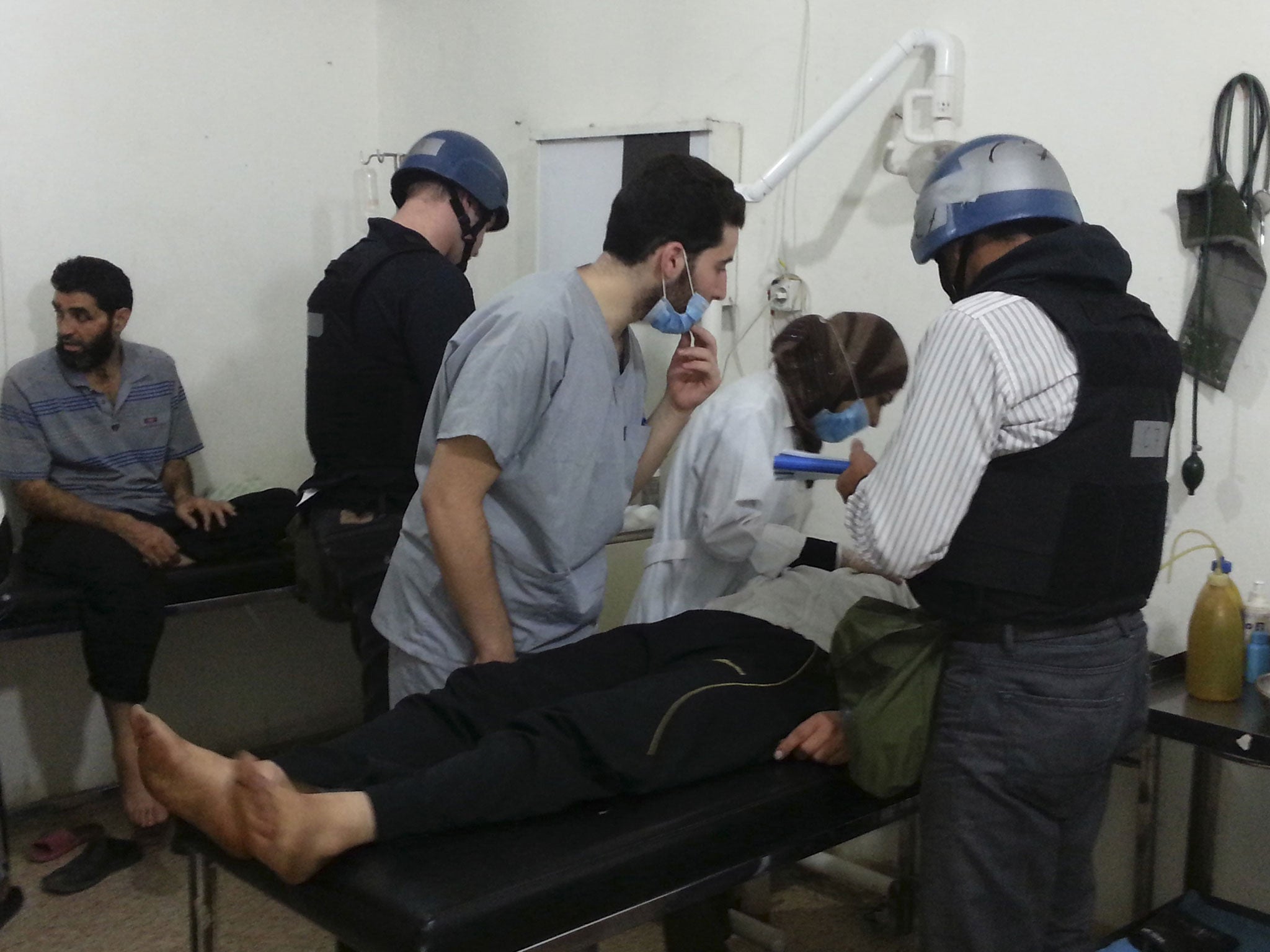UN inspectors come under sniper fire as they visit alleged gas attack site
Team was hampered in its ability to move around the area to carry out a thorough investigation

Your support helps us to tell the story
From reproductive rights to climate change to Big Tech, The Independent is on the ground when the story is developing. Whether it's investigating the financials of Elon Musk's pro-Trump PAC or producing our latest documentary, 'The A Word', which shines a light on the American women fighting for reproductive rights, we know how important it is to parse out the facts from the messaging.
At such a critical moment in US history, we need reporters on the ground. Your donation allows us to keep sending journalists to speak to both sides of the story.
The Independent is trusted by Americans across the entire political spectrum. And unlike many other quality news outlets, we choose not to lock Americans out of our reporting and analysis with paywalls. We believe quality journalism should be available to everyone, paid for by those who can afford it.
Your support makes all the difference.The UN’s team of weapons inspectors finally visited one of the sites of last week’s alleged gas attack on Monday, coming under sniper fire and even possible mortar strikes as they attempted to ascertain whether the hundreds that died did so as a result of sarin poisoning, which the West increasingly believes would justify military intervention.
The sniper fire sent the UN team scrambling for cover even before they arrived at the site of the alleged chemical attack that took place on the outskirts of Damascus last Wednesday.
After a minor delay, which also followed a mortar attack close to their hotel yesterday morning, the team “visited two hospitals, they interviewed witnesses, survivors and doctors, they also collected some samples,” Secretary General Ban Ki-moon said. He added the UN has made a “strong complaint” about the attack to both the Syrian government and the rebels.
The hospitals the team visited were located in Muadamiyeh, where activists claimed 80 people died during a chemical weapons attack on the morning of 21 August. Footage of the visit posted online showed the team, dressed in flak jackets and light blue UN helmets, talking to patients through an interpreter.
The inspectors just visited one site of the alleged chemical weapons attack, located to the West of the capital. They failed to visit the neighbourhoods of Jobar, Irbin, Ein Tarma and Zamalka, located to the east of the city, where the number of casualties was highest. The Centre for the Documentation of Violations in Syria, an advocacy group that has visited the sites of the attacks, has documented 69 confirmed deaths from chemical exposure in Muadamiyeh, compared with 296 in Zamalka.
According to Mohammed Abdullah, an activist based in the eastern suburb of Saqba, a visit to that rebel-held area was also expected on Monday, saying that the Islam Brigade would ensure protection. But the UN team returned to their hotel following the Muadamiyeh visit.
When questioned by The Independent about the choice to visit the western area first, the UN cited safety issues. “The team is travelling wherever it can gain useful information and where there is a cessation of hostilities allowing it to go about its work,” according to Farhan Haq, a spokesman for the UN Secretary-General.
Wassim al-Ahmad, a member of the Muadamiyeh local council, said five UN investigators visited a make shift hospital, interviewing doctors and around a 100 patients. “They are late, they came six days late,” he said, adding that “all the people have already been buried”. The visits are set to continue tomorrow.
Heavy shelling was reported in Muadamiyeh by activists last night. Western governments have expressed concerns about the thoroughness with which the UN team will be able to operate in an area which has been targeted by conventional fire.
The Syrian National Council condemned the attack on the UN inspectors, stating it was “an attempt by Assad’s regime to intimidate the UN team and prevent it from discovering the truth about Assad’s chemical weapons attacks against civilians”. The rebel umbrella group reaffirmed its commitment to securing the UN mission.
Syrian state media blamed “armed terrorist groups”, its standard reference to the rebels, for the attack.
Join our commenting forum
Join thought-provoking conversations, follow other Independent readers and see their replies
Comments